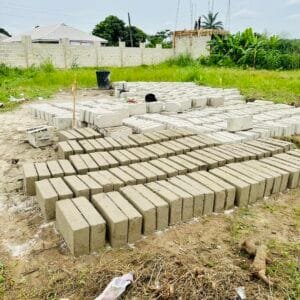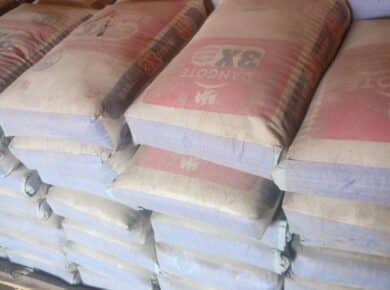The price of 6 inches and 9 inches Blocks in Nigeria varies and it is greatly dependent on the Price of sand, price of cement, size and location. The difference between 9 inches and 6 inches blocks is just the width and thickness. Both have equal length and width.
Are you just starting your construction projects or you’ve even started and need more insights on the price of 5 inches, 6 inches and 9 inches Blocks in Nigeria?
Come with me, as I walk you through the different types of building blocks in Nigeria, the average price of blocks, different sizes of blocks and factors that influence the price of building blocks in Nigeria.
Types of Building Blocks in Nigeria
Building blocks are majorly divided into two which includes The Solid Blocks and the Hollow Blocks. The solid blocks are blocks that are made without drilling a hole in between them while hollow blocks on the other hand are blocks that have holes drilled between them. Hollow blocks are the most common types of building blocks in Nigeria and they have different subtypes which are included in the list below.
- Solid Blocks
- Stretcher Blocks
- Pillar Blocks
- Corner Blocks
- Lintel Blocks
- Jamb Blocks
- Partition Blocks
- Frogged Brick Blocks
- Bullnose Blocks
- Splitface Blocks
- Column Blocks
- Paving Blocks
- Light Aerated Blocks
- Fly Ash Blocks
- Cellular Lightweight Blocks
Solid Blocks
Solid Blocks are building blocks that are strong and heavyweight, they support big buildings and are majorly used in construction projects.
They are usually heavier than hollow blocks but quite cheaper.
Stretcher Blocks
Stretcher Blocks are the most common types of building blocks in Nigeria. They are usually used in building corners and laid parallel to the wall.
Pillar Blocks
Pillar blocks are also known as Double corner blocks. This is one of the types of building blocks and are used for building pillars and piers as its name implies. They are used to create a sign of where each person’s land properties end to avoid trespass or unnecessary arguments.
Corner Blocks
Corner Blocks are building blocks used at corner of wall, door openings and window openings. They are laid in such a way that the plain part of the block will be exterior while the stretcher side will be parallel.
Lintel Blocks
Lintel Blocks are also referred to as Beam Blocks or Channeled Blocks. Lintel Blocks are building blocks with a U-shape and are used above windows and doors to create horizontal support. They are available as 6 by 8 by 16 inches.
Jamb Blocks
Jamb blocks are one of the types of building blocks with 4 hollows. There is one shallow hollow across 2 hollows then one deep hollow.
They are used in double hung windows to provide space in the window casing.
Partition Blocks
Partition Blocks, looks more like pillar blocks just that it is more taller and wider.
Bullnose Blocks
Bullnose Blocks are exactly the same as pillar blocks, just that they have a more rounded end which is the major difference between the two.
Splitface Blocks
Splitface Blocks are one of the types of building blocks in Nigeria that looks like a pillar block. The only difference is that one edge has a very rough edge.
Column Blocks
Column Blocks are one of the types of building blocks in Nigeria that have one hollow/column. They are used for constructing pillars, columns. These building blocks provide stability and load-bearing capacity.
Different Sizes of Building Blocks
Building blocks have different shapes and sizes. There are four standard sizes, we have 4 inches, 6 inches, 8 inches and 12 inches. Building blocks have different shapes but the most common shape is the rectangular shape.
Building blocks are normally 6 inches wide, 8 inches high, and 16 inches long. The size and shape of concrete blocks are determined by the type of structure.
Average Price of Blocks in Nigeria

The most common sizes of building blocks in Nigeria are 5 inches, 6 inches and 9 inches. 5 inches are usually solid non-hollow blocks. A bag of cement produces average of 35 pieces of 9 inches blocks and 45 pieces of 6 inches hollow blocks in Nigeria. A full trip of 10 tons sand produces an average of 450 blocks. Seven fully loaded wheelbarrows of sharp sand mixed with a bag of cement will give you 45 blocks of 6 inches blocks.
| Block Sizes | Average Price in Nigeria |
|---|---|
| 5 inches Solid Blocks | ₦500 |
| 6 inches hollow blocks | ₦550 |
| 6 inches solid blocks | ₦650 |
| 9 inches hollow blocks | ₦650 |
| 9 inches solid blocks | ₦800 |
Price of Blocks in Lagos, Ibadan and Abuja
Price of Building Blocks in Nigeria can be influenced by the size, location and the prices of sand and cement. The price of blocks in Lagos, is slightly different from that of other states. Price of blocks in Abuja is more expensive than Lagos, Port Harcourt, Ibadan and other major states in Nigeria.
Here are the price of blocks in Lagos, Ibadan, Abuja as at the month of February 2025;
| Block Sizes | Price in Lagos | Price in Ibadan | Price in Abuja |
|---|---|---|---|
| 5” Non-Hollow Blocks | ₦450 to ₦500 | ₦450 | ₦550 |
| 6” Hollow Blocks | ₦500 | ₦500 | ₦550 |
| 6” Non-Hollow Blocks | ₦600 | ₦600 | ₦700 |
| 9” Hollow Blocks | ₦650 | ₦650 | ₦750 |
| 9” Non-Hollow Blocks | ₦750 | ₦750 | ₦850 |
Difference Between 9 inches and 6 inches Block
- 9 inches blocks measures 9″ wide while 6 inches blocks measures 6″ wide
- 9 inches blocks has more thickness than 6 inches blocks.
- 9 inches blocks looks more balanced on the ground because of its wider width than 6 inches blocks
- 9 inches blocks are more suitable for load-bearing structures while 6 inches blocks are mostly used for non load-bearing structures.
- 9 inches blocks are more expansive than 6 inches blocks in Nigeria.
- For quality purposes, a bag of cement produces 30 pieces of 9 inches blocks while same bag can produce 45 pieces of 6 inches blocks.
- 6 inches and 9 inches have equal height and length but the difference is in the width and thickness.
Factors that Influence the Price of 6 inches and 9 inches Blocks in Nigeria
Price of Cement
Prices of cement aren’t stable in Nigeria. Because cement is used in the production of these building blocks, it definitely influences the price of 6 inches and 9 inches Blocks in Nigeria. As the prices of cements increases, the price of 6 inches and 9 inches Blocks also increases.
Price of Sand
Price of sand is also one of the factors that influence the price of 6 inches and 9 inches Blocks in Nigeria.
Sand is also used in the production of building blocks and it also influence the price of 6 inches and 9 inches Blocks in Nigeria.
RECOMMENDED FOR YOU; Long Span Aluminium Roofing Sheets Price in Nigeria
Location
Location also influence the price of 6 inches and 9 inches Blocks in Nigeria. The price of blocks in Ibadan slightly differs from that of Abuja or Lagos.
In conclusion, The prices of building blocks in Nigeria are influenced by the size, type, price of cement, price of sand and location.
Due to the increasing change in price of building materials in Nigeria, it is best to buy your materials as soon as possible.








